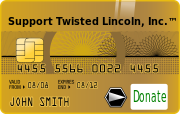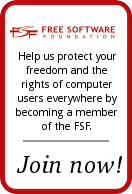You are here
Boycott a product, or use an alternative-- don't use an unauthorized copy
When one is faced with a situation where a piece of software contains oppressive technology such as Product Activation or DRM, it is tempting to simply use an unauthorized copy that does not employ such measures: a so-called "software crack."
On its face, such an act does not seem all that bad; after all, no money goes to support the software vendor that would seek to hinder your freedoms. But when one looks deeper, it becomes clear that using a cracked copy is doing more harm than good.
The proliferation of unauthorized "cracked" software is the primary explanation provided by software vendors when asked why they employ oppressive technology. By using such software, you are in fact supporting that vendors decision to use DRM, by virtue of the fact that you are not paying for their product.
Moreover, the continued use and/or distribution of the unauthorized software only serves to strengthen that vendor's market share. It can be argued that the dominance of Microsoft Windows as the most popular PC operating system is due in part to the vast amount of people who have distributed it without authorization. Even if you simply use the product, rather than pass it on, the use of unlicensed software does nothing more for you than cause you to be further dependent on that particular product, a situation that can have serious consequences for you.
Say for example you use an unauthorized copy of a piece of software in the course of your business. A few years go by, and you have a fair amount of important corporate information stored in the proprietary file formats used by this software. Unfortunately, your PC dies, and because you borrowed a copy of that software from your friend, you do not have the discs with which to reinstall. In order to access your data, you must now acquire a newer version of that software product -- a version which may contain even more restrictive DRM than it's predecessor.
There is typically no reason to use an unauthorized copy of software, barring an important exception: if you already purchased the product. For example, if one was to have accidentally purchased a piece of software that they later discovered contains Product Activation, it is ethically permissible to install a "cracked" version of that software (that does not contain activation) instead of the copy that was purchased. In this manner, the software vendor is still paid for their efforts, and you are still able to fully use the product you purchased. Unfortunately, ethics aside, such an act is an illegal breach of copyright law in many countries, specifically the Digital Millennium Copyright Act in the United States. Because of the legal issues involved, we cannot recommend such a practice. The best course of action is to fully research all licensed products prior to purchase, and boycott any product that uses oppressive technology.
Copyright © 2003-2021 Twisted Lincoln, LLC.




